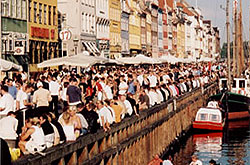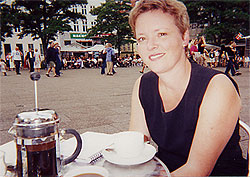Reporter's Notebook
Correspondent Daniel Zwerdling learned some of the most important lessons about the dramatic changes on
Denmark's farms in a rather unlikely place: the crowded streets of central
Copenhagen.
My colleague (producer Rebecca Davis) and I were walking to an interview
with one of the directors of Denmark's leading consumer rights organization
about an issue that perplexed us: How could Danish government and industry
leaders work together so quickly and amicably to crack down on antibiotics
on farms, when their counterparts in the United States have been bitterly
battling over this issue for decades, and American farmers are using more
drugs than ever?
It was a magical day for an interview: the sun was dropping and bathing the
15th and 16th Century buildings in shades of gold and shadow. Fruit and
flower vendors were shouting out their sales refrains, sounding like
old-time preachers. Street musicians were struggling to compete with their
softer guitars and flutes. And everywhere, people: old couples, families
with strollers, teenagers holding hands. A lot of old Copenhagen is closed
to traffic, so it's a human paradise. In fact, hundreds of young people,
maybe thousands, were engaged in their evening ritual: they were crammed
along the banks of a lovely canal in the popular Nyhavn neighborhood,
drinking cases of beers they'd brought from home and watching sailboats bob
in the water. What a mess of bottles and litter this is going to be, we
thought.
 |    |  |
 |
 |
 |
 |  |  |
 |
Young people crammed along the banks of a Copenhagen canal, drinking cases of beers they'd brought from home and watching sailboats bob in the water. Click photo to enlarge
Photo: Daniel Zwerdling |
 |
 |    |  |
A few minutes later, we were sipping iced espressos at an outdoor cafe with
Gitte Gross, a food specialist with the Danish Consumer Council, and she was
explaining that what happened in Denmark around the issue of antibiotics was
really quite simple: When a TV expose in the mid-1990s revealed that farmers
were using large amounts of antibiotics to raise meat animals, and that the
practice might be causing health problems, consumers got
worried that their food might not be safe. So government and industry
leaders took bold action to reassure them by slashing the use of the drugs.
Gross raised her eyebrows, to ask, Now do you understand? No, sorry, we
answered, you make it sound so easy—too easy. After all, consumers in
the United States get upset about all sorts of health and environmental
issues, but that doesn't mean that government and industry leap into action:
To the contrary, government officials often forestall action by studying an
issue for years and years, and industry executives typically defend
themselves and insist that there's no problem. So, we said, there's got to
be something else going on here that you're not explaining. Gross sighed.
And like many Danes from government and industry eventually confirmed, Gross
patiently explained that Danish society is different from the United States.
Here's what they said:
Maybe it's because their country is so small, barely five million people, so
government and industry leaders feel closer and more accountable to ordinary
citizens. Whatever the reason, the nation's political and business leaders
feel a profound obligation to protect the public health and environment.
They truly believe that they are responsible for acting in the best
interests of the population. So when consumers express a deep concern,
government and industry leaders work together to respond to it. If they
don't, consumers react quickly—and the Danish economy feels their wrath.
When consumers felt that government and industry weren't doing enough to
protect them from "mad cow" disease, the sales of beef in Danish
supermarkets plummeted.
 |    |  |
 |
 |
 |
 |  |  |
 |
Gitte Gross, senior food advisor at the Danish Consumer Council.
Photo: Daniel Zwerdling |
 |
 |    |  |
Perhaps that's why Chris Terkildsen, a spokesman for the chicken industry,
seemed puzzled when I asked him if he and other industry executives really
believed Danish government studies showing that antibiotics on farms were
causing health problems. "Of course, we believe them," he said. Meanwhile,
his American counterparts denounce U.S. government studies that show similar
results.
As Gitte Gross was explaining all this at the outdoor cafe, a man sipping
beer at the next table suddenly leaned over and interrupted us. "Forgive
me," he said in English, "I can't help overhearing some of your conversation
about antibiotics. I have a personal interest in this issue.
"I raise pigs."
It turned out that the farmer, Jens Peter Ravn, was in Copenhagen visiting
his son, and he said he didn't have any qualms turning over his farm for a
few day to a helper. "My pigs are very healthy," he said. He said when he
first heard rumors that government and industry were planning to crack down
on the use of antibiotics, he was worried that his pigs would start getting
sick and his business would suffer. But, "this is the best thing that's
happened to us," he said. "We are producing food that's healthy for the
Danish consumer, and for the world. I don't think you can go anywhere in
the world and buy pig meat with so little drugs in it." And Ravn said he's
making more money than ever, because he's spending much less money on
medicines.
"I'm proud," Ravn said, "I think Danish farmers are proud, of what we have
accomplished."
As we walked back to the hotel, we passed by the canal again where throngs
of young people had been drinking beer. They were gone now—and so was
every trace that they'd ever been there. No beer bottles. No litter. No
squashed cigarettes on the pavement. Every shred of their impromptu party
had been meticulously cleaned up.

